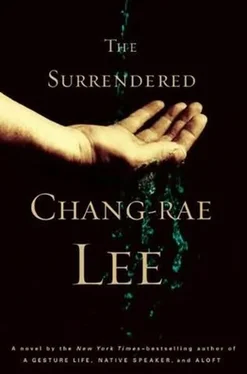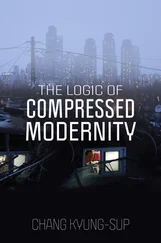But soon they found the right road, and she retrieved the balled-up paper from the car floor, wincing as she reached for it, and then opened the map book and carefully smoothed the page out to go back in its spot. Her mood would swing erratically like this, depending on the changing matrix of the pain, the drugs in her system, or the periodic attacks of vertigo that seemed to be gaining in strength and frequency, and with it would ebb her energy and ability to reason. In the space of thirty minutes she might change their routing, or break down, or even lash out at him for driving too slowly. Every so often June tapped him to pull over at the next shoulder so she could shut her eyes for a minute and regain her equilibrium, or else so she could retch, yet time after time she’d emerge from the restroom and don her sunglasses and walk quickly back to the car like she was ready for another hundred kilometers and open the spiral map book to the connecting page.
They had traveled up well past the foothills now and the road narrowed and began to curl severely about the hillsides. The roadway lacked guardrails and the exposed slopes fell away so steeply that June was shutting her eyes as Hector marked the hairpin loops. A local bus had closed in behind them and was riding their bumper; he was driving with her in mind and didn’t speed up, but soon enough June signaled him to stop. The road was too curvy and it was only after a few more switchbacks that he could turn off onto a gravel drive, pulling in a bit too fast. The driveway was even steeper than the road and the car bottomed out on the spine of the rutted path and he had to gun the throttle to get it moving. They slid perilously for a few feet, the front wheel stopping on the edge of the knee-deep rainwater ditch that was cut alongside. June promptly opened the door and leaned over and gagged, dry-heaving; the color in her face was wrong, perfectly metallic and dulled, and he simultaneously noticed through the trees the faded terra-cotta tiles of a roof and followed the road downward.
“What are you doing?” June said, wiping her mouth. “I just need a moment. Then we can move on.”
“We’re stopping for a while.”
“I’m okay. Turn around now. Hector…”
He didn’t reply, and for the first time in the few days they’d been together she didn’t overrule him. She had already closed her eyes, holding on to the door handle as they bumped fitfully down the hill, kicking up a trail of dust. The driveway suddenly ran out around the next turn, stopping mid-hill, two large boulders marking its end; the house sat another twenty or so meters farther down, at the end of a footpath.
He helped June out of the car. She had trouble with the loose footing and he steadied her as they descended. When they reached the steeper footpath she lost her balance but he caught her before she fell, lifting her in his arms. She held on to him tightly, her hands slung around his neck. It stunned him, how she was hardly there; she was as light as a box kite. He felt uneasy, touching her. While they were briefly married he never touched her, except that final night before their agreed-upon separation, when she had plied him with more liquor after he’d come home from a night’s drinking and then later startled him from his dead man’s sleep, straddling him as he spasmed awake. She left their flat right then, leaving him with the feeling that he’d been not so much used as robbed.
Now he carried her to the house, where she asked to be let down, but she didn’t make a move to stand and he realized she wished to recline. There was an old wooden bench tipped over in the high grass near the house and he righted it with his foot and laid her down. She was suffering, her knees tucked up into her chest. Her sandals had come off and her feet looked blanched and skeletal. The haze had dissipated and the late afternoon sunlight was still brilliant, if not hot, and Hector decided to check the house to see if she could rest where it was less bright.
The cottage was perhaps a hundred years old, made of varied stones reset and remortared over the years, with a single square, shuttered-up window in the north wall speckled with dormant moss. The place was likely a hunter’s retreat, for there were ropes left hanging from a large tree nearby, for stringing up game. The short, scarred door was pad-locked but the screws played in the rotted wood of the jamb and with a few hard shakes he was able to free the rusted iron and push the door in. A faint smell of ash rose up from the darkness; someone had been there in the last few days. He opened the shutters of the windows and could now see the entirety of the space, a room roughly three meters by four meters: there was a hearth on the short wall and a rough-hewn table in the center with two stools, and a canvas cot topped with a sleeping bag. The plastered walls were hung with ancient threadbare tapestries that appeared they might crumble on touch. He unzipped the sleeping bag and it smelled of a person but not strongly and he went out and got June. He laid her down. She asked for her kit and he hiked back up to the car to retrieve it. But when he returned she was already asleep, her face pinched with hurt, mumbling like she was explaining something detailed and complicated and maybe unpleasant. Did she say the name Sylvie? He thought about giving her a shot anyway, to relieve her of course, but also in the hope of quieting her, so she wouldn’t make any such mention again, but he started a fire instead in the hearth, as the cottage was cool from being shuttered up.
Soon enough, however, she was awake. “Where’s the car?”
He nodded up the hill.
“What are you doing?”
“Making some food.”
He was filling a cast-iron pot with some ingredients he’d found. In a cabinet there was a stock of home-canned goods, jars of white beans and tomatoes and pickled meat and anchovies. There was also olive oil and bread crisps and several bottles of what looked like homemade wine, along with a canister of coarse salt.
“I don’t want to eat.”
“Well, I do.” He was hungry, not having had a real meal in days. He’d almost forgotten to eat, being with her.
“We need to go,” she said, trying to sit up. “It’s probably only an hour to Siena. You can eat when we get there.”
“You ought to rest.”
“I’ve rested enough.”
“You should rest more.”
“Please don’t tell me what to do.”
“Whatever you want. But I think you should stop for a while. Otherwise you’ll die. You’ll die before finding him.”
His words gave her pause, and then she lay back down and watched him. While she was sleeping he had also found a small terrace garden carved out of the hillside a few steps below the cottage. It was overgrown and mostly gone to seed but there were some onions and carrots and an immense zucchini, and he’d cut these up with a knife he’d also found in the cabinet. The pot had a swivel handle, which he affixed to the hook above the fire. In it he fried the vegetables and then added the jarred beans and tomatoes and a little water. There was no plumbing in the cottage or well that he could find outside, and so he used the bottled water they were carrying in the car.
Finally she said, “What are you making?”
“I guess a stew. Does the smell bother you?”
“It’s okay. Is it like what you used to make?”
He didn’t know what she meant, but then the sight of her face staring at him suddenly jogged his memory.
“Not really.”
When he was in the army he did a stint at the base mess before his general soldiering, and at the orphanage he would make dinner for the children whenever he was able to get foodstuffs from the PX, this once every couple of weeks. The aunties usually prepared rice and a soup made from wild greens and potatoes and whatever meat they could manage, sometimes dumplings filled with bean threads and chives, but after a particularly successful trading session with the PX sergeant he’d make a “camper’s stew” of everything he hauled back-canned corn, green beans, Campbell’s tomato soup, frozen beef patties or hot dogs or Spam, egg noodles, and Tabasco; the kids went crazy for it, they’d yell Campus-too! not knowing what they were saying, and crowd too closely around the stockpots on the blazing outdoor cooker.
Читать дальше











